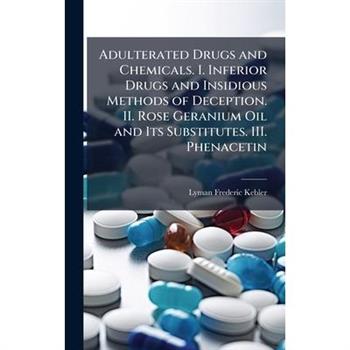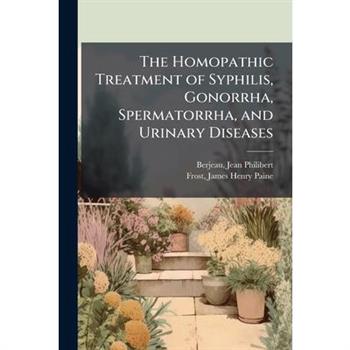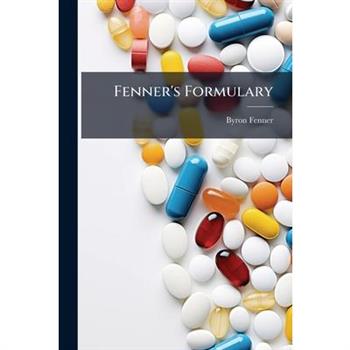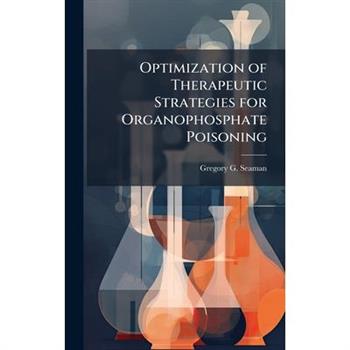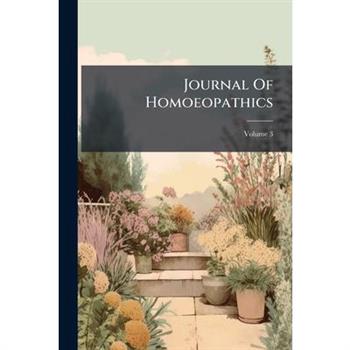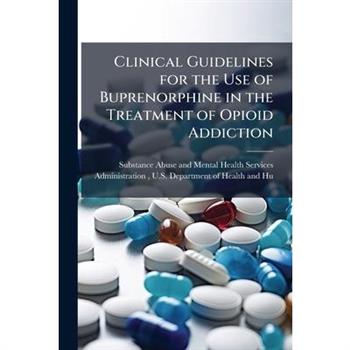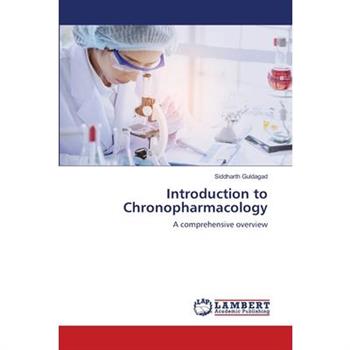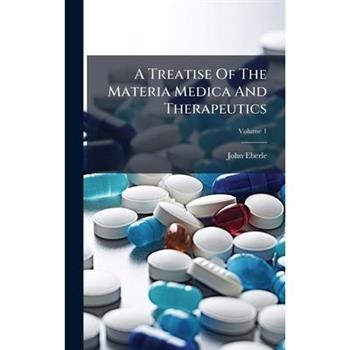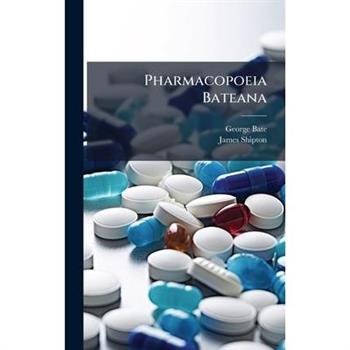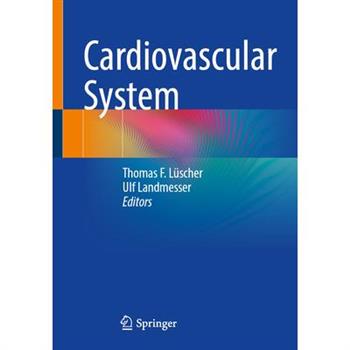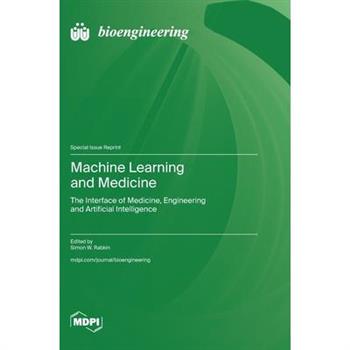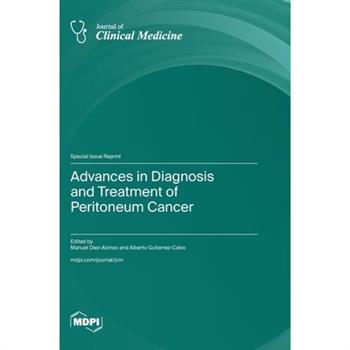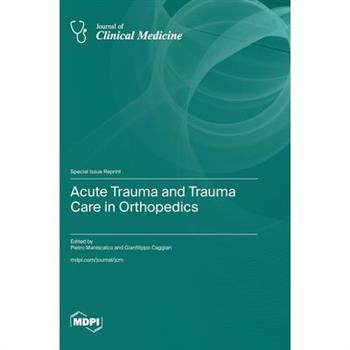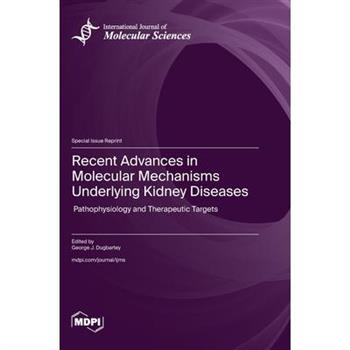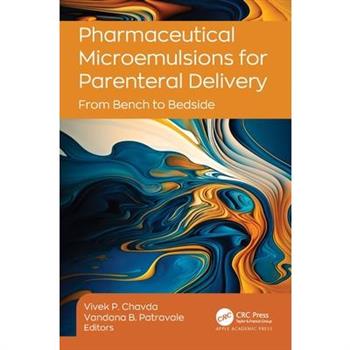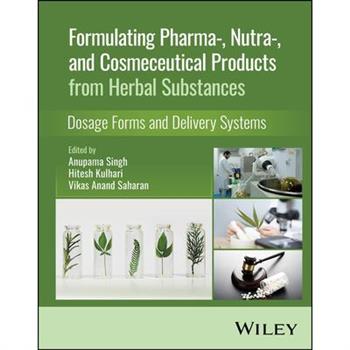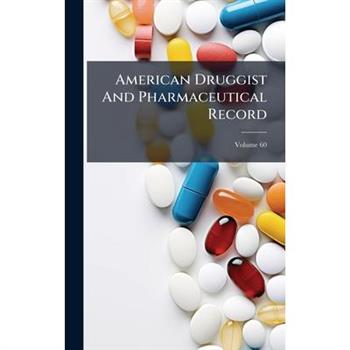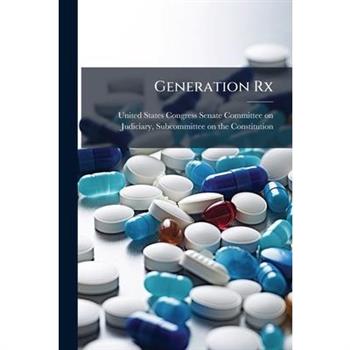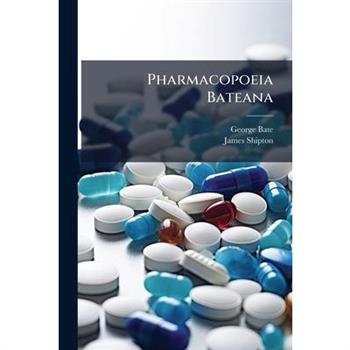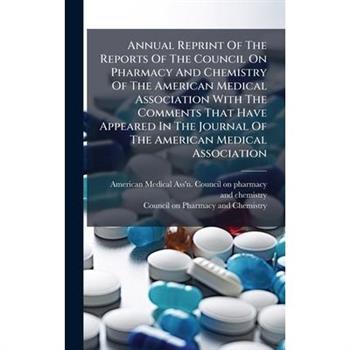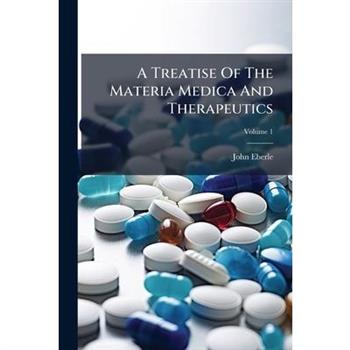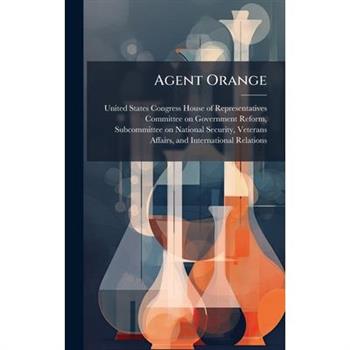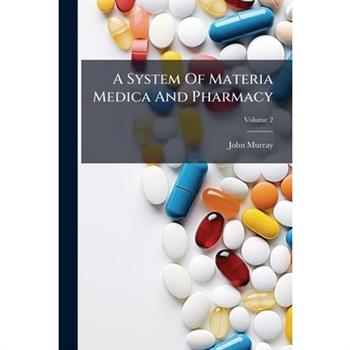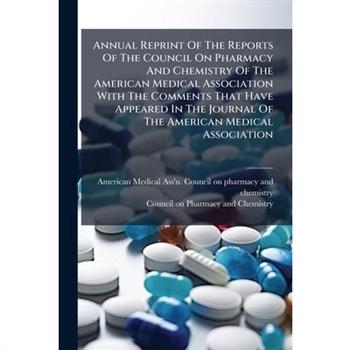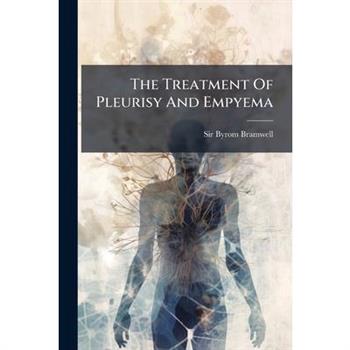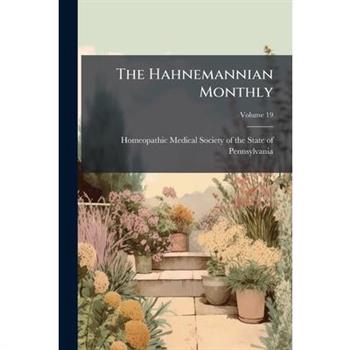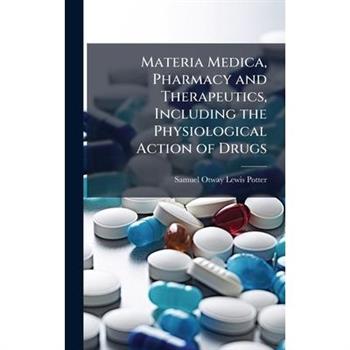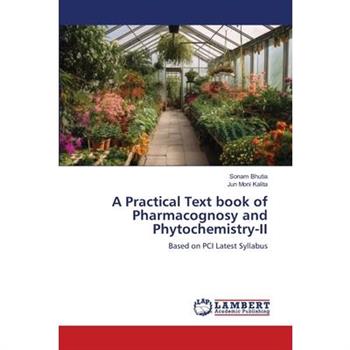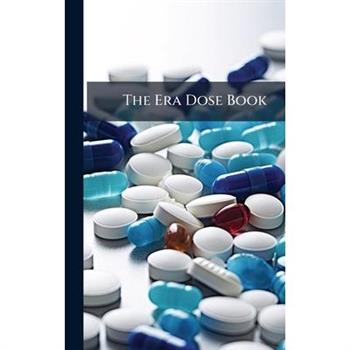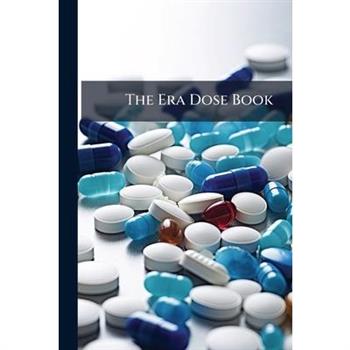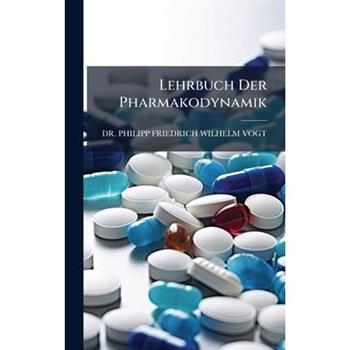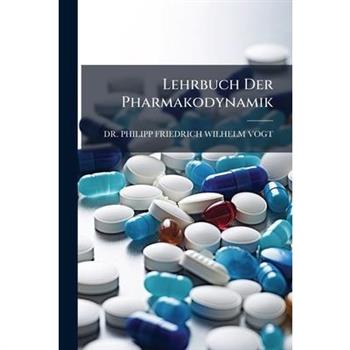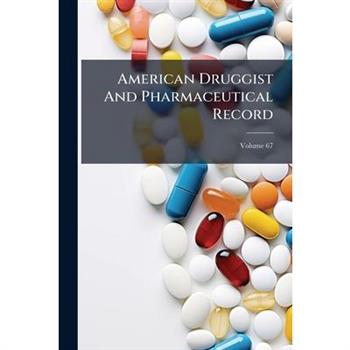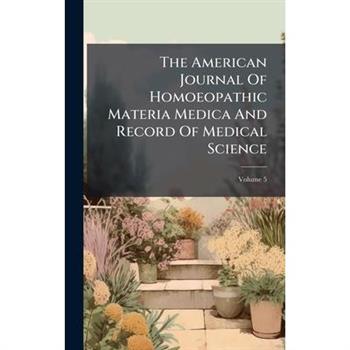Adulterated Drugs and Chemicals. I. Inferior Drugs and Insidious Methods of Deception. II. Rose Geranium Oil and Its Substitutes. III. Phenacetin
Adulterated Drugs and Chemicals is a crucial early 20th-century work addressing the pervasive issues of drug adulteration and deceptive practices within the pharmaceutical industry. This comprehensive volume, divided into three key sections, meticulously examines inferior drugs, insidious methods of deception, and the commercial status of essential pharmaceutical ingredients. The first section focuses on identifying inferior drugs and exposes the fraudulent techniques used to deceive consumers. The second delves into the substitutes and adulterants found in rose geranium oil, a widely used ingredient. Finally, the study provides a detailed analysis of phenacetin, an analgesic drug, including its methods of analysis and commercial status. This historical text is invaluable for researchers, historians, and anyone interested in the origins of pharmaceutical regulation and the challenges of ensuring drug quality and authenticity. It offers insights into the early practices of drug manufacturing and provides a stark reminder of the importance of rigorous quality control in the pharmaceutical industry.This work has been selected by scholars as being culturally important, and is part of the knowledge base of civilization as we know it. This work was reproduced from the original artifact, and remains as true to the original work as possible. Therefore, you will see the original copyright references, library stamps (as most of these works have been housed in our most important libraries around the world), and other notations in the work.This work is in the public domain in the United States of America, and possibly other nations. Within the United States, you may freely copy and distribute this work, as no entity (individual or corporate) has a copyright on the body of the work.As a reproduction of a historical artifact, this work may contain missing or blurred pages, poor pictures, errant marks, etc. Scholars believe, and we concur, that this work is important enough to be preserved, reproduced, and made generally available to the public. We appreciate your support of the preservation process, and thank you for being an important part of keeping this knowledge alive and relevant.
The Homopathic Treatment of Syphilis, Gonorrha, Spermatorrha, and Urinary Diseases
"The Homopathic Treatment of Syphilis, Gonorrha, Spermatorrha, and Urinary Diseases" offers a detailed exploration of homeopathic approaches to treating various venereal and urinary ailments prevalent in the 19th century. Penned by Jean Philibert Berjeau and edited by James Henry Paine Frost, this historical medical text provides insights into the diagnostic methods and therapeutic interventions utilized within the homeopathic tradition during this era. The book delves into the specifics of syphilis, gonorrhea, spermatorrhea, and a range of urinary diseases, presenting case studies and treatment protocols that reflect the medical knowledge and practices of the time. This volume serves as a valuable resource for historians of medicine, homeopathic practitioners, and anyone interested in the evolution of medical treatments for sexually transmitted and urinary conditions.This work has been selected by scholars as being culturally important, and is part of the knowledge base of civilization as we know it. This work was reproduced from the original artifact, and remains as true to the original work as possible. Therefore, you will see the original copyright references, library stamps (as most of these works have been housed in our most important libraries around the world), and other notations in the work.This work is in the public domain in the United States of America, and possibly other nations. Within the United States, you may freely copy and distribute this work, as no entity (individual or corporate) has a copyright on the body of the work.As a reproduction of a historical artifact, this work may contain missing or blurred pages, poor pictures, errant marks, etc. Scholars believe, and we concur, that this work is important enough to be preserved, reproduced, and made generally available to the public. We appreciate your support of the preservation process, and thank you for being an important part of keeping this knowledge alive and relevant.
Characteristic Materia Medica Memorizer
"Characteristic Materia Medica Memorizer" by William H. Burt, originally published in 1895, serves as a comprehensive guide to homeopathic materia medica. This book is designed to aid practitioners and students in memorizing and understanding the key characteristics of various homeopathic remedies. Organized for quick reference, it details the specific symptoms and conditions each remedy is best suited to address. Burt's work reflects the state of homeopathic practice in the late 19th century, offering insights into the remedies commonly used during that era. It remains a valuable resource for those interested in the history of homeopathy and the traditional methods of remedy selection. "Characteristic Materia Medica Memorizer" provides a unique glimpse into the therapeutic approaches of the past and continues to be studied by contemporary homeopaths and historians of medicine.This work has been selected by scholars as being culturally important, and is part of the knowledge base of civilization as we know it. This work was reproduced from the original artifact, and remains as true to the original work as possible. Therefore, you will see the original copyright references, library stamps (as most of these works have been housed in our most important libraries around the world), and other notations in the work.This work is in the public domain in the United States of America, and possibly other nations. Within the United States, you may freely copy and distribute this work, as no entity (individual or corporate) has a copyright on the body of the work.As a reproduction of a historical artifact, this work may contain missing or blurred pages, poor pictures, errant marks, etc. Scholars believe, and we concur, that this work is important enough to be preserved, reproduced, and made generally available to the public. We appreciate your support of the preservation process, and thank you for being an important part of keeping this knowledge alive and relevant.
Fenner's Formulary
"Fenner's Formulary" is a comprehensive collection of pharmaceutical formulas and preparations from the late 19th century. Compiled by Byron Fenner, this formulary offers a detailed look into the practices and ingredients used by pharmacists and apothecaries of the time. This historical text provides insight into the composition and application of various medicinal compounds, offering a valuable resource for historians of medicine, pharmaceutical researchers, and anyone interested in the evolution of healthcare practices. It is a fascinating glimpse into the world of traditional medicine and the formulas that shaped it.This work has been selected by scholars as being culturally important, and is part of the knowledge base of civilization as we know it. This work was reproduced from the original artifact, and remains as true to the original work as possible. Therefore, you will see the original copyright references, library stamps (as most of these works have been housed in our most important libraries around the world), and other notations in the work.This work is in the public domain in the United States of America, and possibly other nations. Within the United States, you may freely copy and distribute this work, as no entity (individual or corporate) has a copyright on the body of the work.As a reproduction of a historical artifact, this work may contain missing or blurred pages, poor pictures, errant marks, etc. Scholars believe, and we concur, that this work is important enough to be preserved, reproduced, and made generally available to the public. We appreciate your support of the preservation process, and thank you for being an important part of keeping this knowledge alive and relevant.
Optimization of Therapeutic Strategies for Organophosphate Poisoning
The National Preparedness Vision requires the U.S. be prepared to prevent, protect against, respond to, and recover from all hazards associated with a chemical attack. Results of this study demonstrate that we cannot protect service members and first responders as required following a nerve agent attack. The research presented herein aimed to construct a physiologically based pharmacokinetic model to determine optimal therapeutic strategies for organophosphate (nerve agent) poisoning. The constructed model integrated organophosphates and two antidotes, atropine and oximes. Model results reasonably mirrored literature data and anecdotal observations of organophosphate poisoning. Results suggest a symptoms-based dosing strategy of atropine and a time-based dosing strategy of oximes. For patients severely poisoned with organophosphorus nerve agents, model results support documented claims of oxime's inefficacy and tendency to heighten the severity of poisoning. The results strongly indicate that military personnel attacked with nerve agents are at a significant health risk if they employ their prescribed treatment as current doctrine dictates. Results presented herein suggest that oxime use be discontinued as currently prescribed within the context of nerve agent exposure; its use will not alter the effects of nerve agent exposure and may increase the adverse effects.This work has been selected by scholars as being culturally important, and is part of the knowledge base of civilization as we know it. This work was reproduced from the original artifact, and remains as true to the original work as possible. Therefore, you will see the original copyright references, library stamps (as most of these works have been housed in our most important libraries around the world), and other notations in the work.This work is in the public domain in the United States of America, and possibly other nations. Within the United States, you may freely copy and distribute this work, as no entity (individual or corporate) has a copyright on the body of the work.As a reproduction of a historical artifact, this work may contain missing or blurred pages, poor pictures, errant marks, etc. Scholars believe, and we concur, that this work is important enough to be preserved, reproduced, and made generally available to the public. We appreciate your support of the preservation process, and thank you for being an important part of keeping this knowledge alive and relevant.
Dosage Calculations Made Easy for Nursing Students
Dosage Calculations Made Easy for Nursing Students 500+ Step-by-Step Practice Problems with Complete Solutions and Explanations Are you a nursing student struggling with medication math and dreading your next dosage calculation exam? Master dosage calculations the safe and easy way with this comprehensive workbook featuring 500+ practice problems designed specifically for nursing students. This step-by-step guide transforms complex calculations into simple, manageable processes that build your confidence from basic math review through advanced clinical scenarios. Inside this essential nursing companion, you'll discover: Three proven calculation methods (dimensional analysis, ratio-proportion, and formula method)t explained in clear, anxiety-reducing language 500+ practice problems with complete solutions and detailed explanations for every step Progressive difficulty levels starting with basic conversions and advancing to complex IV drip rates and pediatric dosing Real clinical scenarios that prepare you for actual nursing practice, not just exams NCLEX-style questions aligned with current testing standards to boost your exam readiness Common medication errors and how to avoid them, ensuring patient safety in your future practice Quick reference charts for conversions, abbreviations, and formulas you'll use daily Unlike other overwhelming textbooks, this guide addresses math anxiety head-on with encouraging explanations and multiple approaches to solve each problem type. Each chapter builds systematically on previous concepts, ensuring you never feel lost or overwhelmed. Perfect for: Nursing students at all levels (LPN, ADN, BSN, MSN) NCLEX-RN and NCLEX-PN exam preparation Practicing nurses seeking a comprehensive refresher Nursing educators looking for supplemental teaching resources Transform your calculation skills and walk into your exams with confidence. Join thousands of nursing students who have conquered their math fears and mastered medication calculations using this proven approach.
Journal Of Homoeopathics
Explore the world of 19th-century homeopathic medicine with "Journal Of Homoeopathics, Volume 3." This historical journal offers a fascinating glimpse into the practices, theories, and debates surrounding homeopathy during a pivotal period in its development. Compiled anonymously, this volume provides insights into the remedies, case studies, and philosophical underpinnings that defined the field. This journal is a valuable resource for historians of medicine, students of alternative therapies, and anyone interested in the evolution of healthcare practices. Delve into the original texts and discover the rich history of homeopathic thought and its impact on medical treatment.This work has been selected by scholars as being culturally important, and is part of the knowledge base of civilization as we know it. This work was reproduced from the original artifact, and remains as true to the original work as possible. Therefore, you will see the original copyright references, library stamps (as most of these works have been housed in our most important libraries around the world), and other notations in the work.This work is in the public domain in the United States of America, and possibly other nations. Within the United States, you may freely copy and distribute this work, as no entity (individual or corporate) has a copyright on the body of the work.As a reproduction of a historical artifact, this work may contain missing or blurred pages, poor pictures, errant marks, etc. Scholars believe, and we concur, that this work is important enough to be preserved, reproduced, and made generally available to the public. We appreciate your support of the preservation process, and thank you for being an important part of keeping this knowledge alive and relevant.
Aeromedical Evacuation
Modern aeromedical evacuation finds it roots grounded on the lessons learned during the first global war with fully integrated airpower...World War II. During this war, the Army Air Forces created aeromedical evacuation not only out of moral obligation, but also out of necessity. Wounded soldiers, sailors, marines, and airmen needed evacuation over long distances from distant battlefields to reach adequate medical care. The sheer number of casualties drove the need for a robust, efficient aeromedical evacuation system. During the maturation of aeromedical evacuation operations, the Army Air Forces learned several, hard-fought lessons concerning multi-purpose cargo aircraft with standardized equipment, organization, and the command and control of air mobility forces conducting aeromedical evacuation. These lessons learned are still very pertinent in today's combat environment as well as for aeromedical operations in the future.This work has been selected by scholars as being culturally important, and is part of the knowledge base of civilization as we know it. This work was reproduced from the original artifact, and remains as true to the original work as possible. Therefore, you will see the original copyright references, library stamps (as most of these works have been housed in our most important libraries around the world), and other notations in the work.This work is in the public domain in the United States of America, and possibly other nations. Within the United States, you may freely copy and distribute this work, as no entity (individual or corporate) has a copyright on the body of the work.As a reproduction of a historical artifact, this work may contain missing or blurred pages, poor pictures, errant marks, etc. Scholars believe, and we concur, that this work is important enough to be preserved, reproduced, and made generally available to the public. We appreciate your support of the preservation process, and thank you for being an important part of keeping this knowledge alive and relevant.
Clinical Guidelines for the Use of Buprenorphine in the Treatment of Opioid Addiction
Offers guidelines to physicians using buprenorphine for the medication-assisted treatment of opioid addiction. Explains the pharmacology of buprenorphine, patient assessment, treatment protocols, needs of special populations, and policies and procedures.This work has been selected by scholars as being culturally important, and is part of the knowledge base of civilization as we know it. This work was reproduced from the original artifact, and remains as true to the original work as possible. Therefore, you will see the original copyright references, library stamps (as most of these works have been housed in our most important libraries around the world), and other notations in the work.This work is in the public domain in the United States of America, and possibly other nations. Within the United States, you may freely copy and distribute this work, as no entity (individual or corporate) has a copyright on the body of the work.As a reproduction of a historical artifact, this work may contain missing or blurred pages, poor pictures, errant marks, etc. Scholars believe, and we concur, that this work is important enough to be preserved, reproduced, and made generally available to the public. We appreciate your support of the preservation process, and thank you for being an important part of keeping this knowledge alive and relevant.
Introduction to Chronopharmacology
The book provides the detail introduction of Chronopharmacology. Chronopharmacology is the study of how biological rhythms, such as circadian rhythms, influence the absorption, distribution, metabolism, and effects of drugs. It examines the timing of drug administration and its impact on efficacy, safety, and patient outcomes.The book itself describes the pharmacokinetic and pharmacodynamics process invlove in chronopharmacology. It also gives the detail information of chronotoxicology, biological clocks how they affect the chronopharmacology. The book describes the applications and various challenges and future Perspectives in chronopharmacology.
A Treatise Of The Materia Medica And Therapeutics
"A Treatise Of The Materia Medica And Therapeutics, Volume 1" by John Eberle offers a comprehensive overview of medicinal substances and their therapeutic applications. This volume provides detailed descriptions of various drugs and their effects on the human body, reflecting the medical knowledge and practices of the time. Eberle's work is an invaluable resource for understanding the history of pharmacology and the evolution of medical treatments. It provides insights into the methods used to diagnose and treat diseases in the 19th century. This historical text is essential for anyone interested in the history of medicine, pharmacology, and therapeutic practices.This work has been selected by scholars as being culturally important, and is part of the knowledge base of civilization as we know it. This work was reproduced from the original artifact, and remains as true to the original work as possible. Therefore, you will see the original copyright references, library stamps (as most of these works have been housed in our most important libraries around the world), and other notations in the work.This work is in the public domain in the United States of America, and possibly other nations. Within the United States, you may freely copy and distribute this work, as no entity (individual or corporate) has a copyright on the body of the work.As a reproduction of a historical artifact, this work may contain missing or blurred pages, poor pictures, errant marks, etc. Scholars believe, and we concur, that this work is important enough to be preserved, reproduced, and made generally available to the public. We appreciate your support of the preservation process, and thank you for being an important part of keeping this knowledge alive and relevant.
Pharmacopoeia Bateana
Pharmacopoeia Bateana, originally compiled by George Bate, a prominent physician of the 17th century, offers a fascinating glimpse into the medical practices and pharmacological knowledge of the era. This comprehensive volume, later edited and expanded by James Shipton, presents a wide array of medicinal preparations, ingredients, and recipes used to treat various ailments. A valuable historical resource, this book sheds light on the evolution of medicine and the remedies employed before modern scientific advancements. Researchers, historians of medicine, and anyone interested in the historical uses of plants and other natural substances in healing will find this a treasure trove of information. This book provides a window into a world where medicine was as much an art as it was a science. Explore the remedies and practices that shaped medical treatment in a bygone era with Pharmacopoeia Bateana.This work has been selected by scholars as being culturally important, and is part of the knowledge base of civilization as we know it. This work was reproduced from the original artifact, and remains as true to the original work as possible. Therefore, you will see the original copyright references, library stamps (as most of these works have been housed in our most important libraries around the world), and other notations in the work.This work is in the public domain in the United States of America, and possibly other nations. Within the United States, you may freely copy and distribute this work, as no entity (individual or corporate) has a copyright on the body of the work.As a reproduction of a historical artifact, this work may contain missing or blurred pages, poor pictures, errant marks, etc. Scholars believe, and we concur, that this work is important enough to be preserved, reproduced, and made generally available to the public. We appreciate your support of the preservation process, and thank you for being an important part of keeping this knowledge alive and relevant.
Cardiovascular System
The Big Picture It's always the same: When the exciting disease patterns finally arrive in the clinical phase, anatomy and physiology are long forgotten. One has to struggle to review everything in order to understand what the disease is about. Why not learn an organ system "in one piece" from anatomy to physiology, to the diagnostics and therapy of diseases? This book is ideal for learning in the module; here you will understand the organ system in context. The diseases of the cardiovascular system are systematically addressed--finally, a single book is sufficient to work through the entire topic block. And it will help you with: Practical guidelines for diagnostics and therapy Numerous diagnostic images Latest findings and therapeutic procedures Key phrases, tables, and overviews with the most important facts Due to its practical relevance, this volume is well-suited for both medical students and doctors in cardiological training and further education.
Machine Learning and Medicine
The contributions in this Reprint cover various aspects of application such as diagnosis, imaging, and assessing prognosis, collectively demonstrating the improvements in diagnostic accuracy and medical decision making that can be achieved by machine learning approaches
Antioxidant Compounds and Health Benefits of Citrus Fruits
This reprint was developed to provide readers with new and interesting studies on the antioxidant effects of citrus fruit constituents. The investigation and identification of the biological properties of these promising antioxidant compounds, as well as their mechanisms of action, can effectively contribute to the development of new pharmaceutical formulations capable of being used therapeutically in a variety of inflammatory diseases. This compilation of articles adds to the already existing literature with important findings on its effects.
Advances in Diagnosis and Treatment of Peritoneum Cancer
Approximately 4-10% of patients with tumors of the abdominal cavity have peritoneal metastasis (PM) at the time of diagnosis, while 20-40% will develop PM during the evolution of their tumor. Until recently, the diagnosis of PM was ominous and associated with severe and incapacitating symptoms, a poor response to systemic chemotherapy, and a poor survival of 4-6 months. The scenario has changed following the introduction of a new generation of chemotherapy and agents against biological targets, as well as with the introduction of new combined therapies, including cytoreductive surgery and new diagnostic-therapeutic schemes. However, there are still many unresolved issues relating to the role, indications, and efficiency that these new therapeutic schemes may offer. We aimed to evaluate the latest knowledge in relation to PM with respect to the incidence, clinical and molecular prognostic factors, survival, and the role of surgical-chemotherapeutic techniques in this era of biological and immunotherapy agents. Special interest had been placed on colorectal, gastric, and ovarian cancer, as well as primary peritoneal cancer.
Acute Trauma and Trauma Care in Orthopedics
Orthopedics and trauma surgery are clinically challenging areas involving the treatment of injuries and related diseases of the musculoskeletal system, which can be caused by trauma, accidents, sports injuries, degenerative and congenital diseases, infections, and tumors. We have witnessed developments in all aspects of orthopedic surgery, such as the use of both invasive procedures and non-invasive and non-surgical methods to correct and treat disease. Common orthopedic problems include knee osteoarthritis, spinal deformities, and a variety of different sports injuries. Since these health conditions can greatly affect a person's quality of life, it is important for patients to receive a high level of treatment from an experienced physician. Consequently, there is also an increasing need for interdisciplinary treatment strategies, as these patients often present with underlying comorbidities that could have led to the injury itself, and thus require specific treatment regimens.This Special Issue combines original research and review papers, with a focus on the recent advances in orthopedics and trauma surgery.
New Strategies in Preventing Inflammatory and/or Oxidative-Stress-Induced Damages in Ischemia-Reperfusion Injury
This Reprint brings together a set of original articles and reviews that explore the multifaceted nature of ischemia-reperfusion injury, a process central to many acute and chronic conditions. The contributions reflect different perspectives-from basic cellular mechanisms to preclinical models and early clinical observations-offering a broad view of how oxidative stress, inflammation, and mitochondrial dysfunction interact in the pathophysiology of reperfusion injury. Several studies focus on antioxidant-based interventions, ranging from classical molecules to newer therapeutic approaches that modulate endogenous defense systems. Others examine biomarkers, imaging tools, or the timing of intervention as key elements in preventing irreversible damage. Rather than presenting definitive conclusions, the articles collected here underline the complexity of the phenomenon and the challenges that remain. This Reprint may be of interest to those working in experimental medicine, surgery, neuroscience, cardiovascular research, and related disciplines, where reperfusion injury remains a major hurdle to improving outcomes.
Recent Advances in Molecular Mechanisms Underlying Kidney Diseases
Kidney diseases remain a major public health concern associated with increasing morbidity and the mortality of millions of people globally. Recently, the prevalence of kidney diseases has increased significantly. Their pathological hallmarks include the excessive accumulation and deposition of the extracellular matrix, mesangiolysis, the thickening of the glomerular basement membrane, tubulointerstitial fibrosis, and many more, which eventually lead to the loss of kidney function. As the pathogenesis of kidney diseases is multifactorial, several experimental models have recently been established to mimic clinical situations and provide a mechanistic understanding of various renal pathologies, with the aim of identifying and developing potential therapeutic targets. These models have been utilized to identify several underlying molecular mechanisms, including the following: the PI3K/Akt/mTOR, Jak/Stat, and inflammatory signaling pathways; the activation of the renal hydrogen sulfide system; the induction of oxidative and endoplasmic reticulum stress and apoptotic pathways; the activation of fibroblasts and the renin-angiotensin-aldosterone system; and mitochondrial dysfunction. Targeting these molecular mechanisms has proven to be beneficial and offers huge potential for developing novel therapies. This Special Issue focuses on recent developments in research on the pathophysiology of kidney diseases and their therapeutic targets for diagnosis and treatment.
Pharmaceutical Microemulsions for Parenteral Delivery
Details information on the preformulation of drugs, formulation using quality by design (QbD) principles, and characterization of parenteral microemulsions for drug delivery. Explores the role of surfactants and cosurfactants in formulation, clinical aspects of parenteral microemulsion, regulatory perspectives and patents, etc.
Formulating Pharma-, Nutra-, and Cosmeceutical Products from Herbal Substances
A practical and up-to-date discussion of the formulation and design of dosage forms and delivery systems containing herbal ingredients In Formulating Pharma-, Nutra-, and Cosmeceutical Products from Herbal Substances: Dosage Forms and Delivery Systems, a team of distinguished researchers delivers a step-by-step approach to preparing and manufacturing dosage forms and delivery systems. Intuitively organized with comprehensive coverage of the fundamentals, functional materials, manufacturing, and marketing of pharmaceutical, nutraceutical, and cosmeceutical products, the book also examines regulatory issues of quality, safety, and efficacy. The authors discuss essential formulation development and delivery information for novel and controlled delivery systems of herbal ingredients. Readers will also find: A thorough introduction to the basic principles of developing modern pharma-, nutra-, and cosmeceutical products from herbal substances Comprehensive explorations of conventional formulations, including issues of stability Practical discussions of advanced formulations, including chronotherapeutic delivery systems, liposome-based delivery of phytoconstituents, and nanoparticle mediated delivery of herbal actives Complete treatments of regulatory challenges, including nonclinical characterization and documentation for marketing authorizations of herbal formulations Perfect for professionals working in the herbal drug, natural product, and dietary supplement industries, Formulating Pharma-, Nutra-, and Cosmeceutical Products from Herbal Substances will also benefit academic researchers and graduate students studying herbal research, cosmetics, and pharmaceutical sciences.
Bioidentical Hormones
The BiblioGov Project is an effort to expand awareness of the public documents and records of the U.S. Government via print publications. In broadening the public understanding of government and its work, an enlightened democracy can grow and prosper. Ranging from historic Congressional Bills to the most recent Budget of the United States Government, the BiblioGov Project spans a wealth of government information. These works are now made available through an environmentally friendly, print-on-demand basis, using only what is necessary to meet the required demands of an interested public. We invite you to learn of the records of the U.S. Government, heightening the knowledge and debate that can lead from such publications.This work has been selected by scholars as being culturally important, and is part of the knowledge base of civilization as we know it. This work was reproduced from the original artifact, and remains as true to the original work as possible. Therefore, you will see the original copyright references, library stamps (as most of these works have been housed in our most important libraries around the world), and other notations in the work.This work is in the public domain in the United States of America, and possibly other nations. Within the United States, you may freely copy and distribute this work, as no entity (individual or corporate) has a copyright on the body of the work.As a reproduction of a historical artifact, this work may contain missing or blurred pages, poor pictures, errant marks, etc. Scholars believe, and we concur, that this work is important enough to be preserved, reproduced, and made generally available to the public. We appreciate your support of the preservation process, and thank you for being an important part of keeping this knowledge alive and relevant.
American Druggist And Pharmaceutical Record
Explore the world of pharmaceuticals and medicine at the turn of the 20th century with this fascinating volume of the "American Druggist And Pharmaceutical Record." Volume 60 offers a unique glimpse into the practices, advancements, and challenges facing pharmacists and medical professionals of the era. Readers will find a wealth of information on drug compounding, new pharmaceutical products, legal regulations, and the evolving role of the pharmacist in American society. This historical record is a valuable resource for anyone interested in the history of medicine, pharmacology, or the pharmaceutical industry.This work has been selected by scholars as being culturally important, and is part of the knowledge base of civilization as we know it. This work was reproduced from the original artifact, and remains as true to the original work as possible. Therefore, you will see the original copyright references, library stamps (as most of these works have been housed in our most important libraries around the world), and other notations in the work.This work is in the public domain in the United States of America, and possibly other nations. Within the United States, you may freely copy and distribute this work, as no entity (individual or corporate) has a copyright on the body of the work.As a reproduction of a historical artifact, this work may contain missing or blurred pages, poor pictures, errant marks, etc. Scholars believe, and we concur, that this work is important enough to be preserved, reproduced, and made generally available to the public. We appreciate your support of the preservation process, and thank you for being an important part of keeping this knowledge alive and relevant.
Anleitung Zur Medizinischen Anwendung Der Elektrizit瓣t Und Des Galvanismus
"Anleitung Zur Medizinischen Anwendung Der Elektrizit瓣t Und Des Galvanismus," by Karl Sundelin, explores the medical applications of electricity and galvanism. This historical work, complete with two lithographic plates, offers insights into 19th-century electrotherapy. It details techniques and theories of using electricity in medical treatments, reflecting the state of medical science at the time. This book is a valuable resource for those interested in the history of medicine, alternative therapies, and the early uses of electricity in healthcare. Its detailed explanations provide a glimpse into the past practices and beliefs surrounding electrical treatments.This work has been selected by scholars as being culturally important, and is part of the knowledge base of civilization as we know it. This work was reproduced from the original artifact, and remains as true to the original work as possible. Therefore, you will see the original copyright references, library stamps (as most of these works have been housed in our most important libraries around the world), and other notations in the work.This work is in the public domain in the United States of America, and possibly other nations. Within the United States, you may freely copy and distribute this work, as no entity (individual or corporate) has a copyright on the body of the work.As a reproduction of a historical artifact, this work may contain missing or blurred pages, poor pictures, errant marks, etc. Scholars believe, and we concur, that this work is important enough to be preserved, reproduced, and made generally available to the public. We appreciate your support of the preservation process, and thank you for being an important part of keeping this knowledge alive and relevant.
Generation Rx
The BiblioGov Project is an effort to expand awareness of the public documents and records of the U.S. Government via print publications. In broadening the public understanding of government and its work, an enlightened democracy can grow and prosper. Ranging from historic Congressional Bills to the most recent Budget of the United States Government, the BiblioGov Project spans a wealth of government information. These works are now made available through an environmentally friendly, print-on-demand basis, using only what is necessary to meet the required demands of an interested public. We invite you to learn of the records of the U.S. Government, heightening the knowledge and debate that can lead from such publications.This work has been selected by scholars as being culturally important, and is part of the knowledge base of civilization as we know it. This work was reproduced from the original artifact, and remains as true to the original work as possible. Therefore, you will see the original copyright references, library stamps (as most of these works have been housed in our most important libraries around the world), and other notations in the work.This work is in the public domain in the United States of America, and possibly other nations. Within the United States, you may freely copy and distribute this work, as no entity (individual or corporate) has a copyright on the body of the work.As a reproduction of a historical artifact, this work may contain missing or blurred pages, poor pictures, errant marks, etc. Scholars believe, and we concur, that this work is important enough to be preserved, reproduced, and made generally available to the public. We appreciate your support of the preservation process, and thank you for being an important part of keeping this knowledge alive and relevant.
Anleitung Zur Medizinischen Anwendung Der Elektrizit瓣t Und Des Galvanismus
"Anleitung Zur Medizinischen Anwendung Der Elektrizit瓣t Und Des Galvanismus," by Karl Sundelin, explores the medical applications of electricity and galvanism. This historical work, complete with two lithographic plates, offers insights into 19th-century electrotherapy. It details techniques and theories of using electricity in medical treatments, reflecting the state of medical science at the time. This book is a valuable resource for those interested in the history of medicine, alternative therapies, and the early uses of electricity in healthcare. Its detailed explanations provide a glimpse into the past practices and beliefs surrounding electrical treatments.This work has been selected by scholars as being culturally important, and is part of the knowledge base of civilization as we know it. This work was reproduced from the original artifact, and remains as true to the original work as possible. Therefore, you will see the original copyright references, library stamps (as most of these works have been housed in our most important libraries around the world), and other notations in the work.This work is in the public domain in the United States of America, and possibly other nations. Within the United States, you may freely copy and distribute this work, as no entity (individual or corporate) has a copyright on the body of the work.As a reproduction of a historical artifact, this work may contain missing or blurred pages, poor pictures, errant marks, etc. Scholars believe, and we concur, that this work is important enough to be preserved, reproduced, and made generally available to the public. We appreciate your support of the preservation process, and thank you for being an important part of keeping this knowledge alive and relevant.
Agent Orange
The BiblioGov Project is an effort to expand awareness of the public documents and records of the U.S. Government via print publications. In broadening the public understanding of government and its work, an enlightened democracy can grow and prosper. Ranging from historic Congressional Bills to the most recent Budget of the United States Government, the BiblioGov Project spans a wealth of government information. These works are now made available through an environmentally friendly, print-on-demand basis, using only what is necessary to meet the required demands of an interested public. We invite you to learn of the records of the U.S. Government, heightening the knowledge and debate that can lead from such publications.This work has been selected by scholars as being culturally important, and is part of the knowledge base of civilization as we know it. This work was reproduced from the original artifact, and remains as true to the original work as possible. Therefore, you will see the original copyright references, library stamps (as most of these works have been housed in our most important libraries around the world), and other notations in the work.This work is in the public domain in the United States of America, and possibly other nations. Within the United States, you may freely copy and distribute this work, as no entity (individual or corporate) has a copyright on the body of the work.As a reproduction of a historical artifact, this work may contain missing or blurred pages, poor pictures, errant marks, etc. Scholars believe, and we concur, that this work is important enough to be preserved, reproduced, and made generally available to the public. We appreciate your support of the preservation process, and thank you for being an important part of keeping this knowledge alive and relevant.
Pharmacopoeia Bateana
Pharmacopoeia Bateana, originally compiled by George Bate, a prominent physician of the 17th century, offers a fascinating glimpse into the medical practices and pharmacological knowledge of the era. This comprehensive volume, later edited and expanded by James Shipton, presents a wide array of medicinal preparations, ingredients, and recipes used to treat various ailments. A valuable historical resource, this book sheds light on the evolution of medicine and the remedies employed before modern scientific advancements. Researchers, historians of medicine, and anyone interested in the historical uses of plants and other natural substances in healing will find this a treasure trove of information. This book provides a window into a world where medicine was as much an art as it was a science. Explore the remedies and practices that shaped medical treatment in a bygone era with Pharmacopoeia Bateana.This work has been selected by scholars as being culturally important, and is part of the knowledge base of civilization as we know it. This work was reproduced from the original artifact, and remains as true to the original work as possible. Therefore, you will see the original copyright references, library stamps (as most of these works have been housed in our most important libraries around the world), and other notations in the work.This work is in the public domain in the United States of America, and possibly other nations. Within the United States, you may freely copy and distribute this work, as no entity (individual or corporate) has a copyright on the body of the work.As a reproduction of a historical artifact, this work may contain missing or blurred pages, poor pictures, errant marks, etc. Scholars believe, and we concur, that this work is important enough to be preserved, reproduced, and made generally available to the public. We appreciate your support of the preservation process, and thank you for being an important part of keeping this knowledge alive and relevant.
Annual Reprint Of The Reports Of The Council On Pharmacy And Chemistry Of The American Medical Association With The Comments That Have Appeared In The Journal Of The American Medical Association
This annual reprint compiles the reports of the Council on Pharmacy and Chemistry of the American Medical Association, accompanied by comments published in the Journal of the American Medical Association. It serves as a historical record of the council's assessments and findings related to various pharmaceutical and chemical substances. A valuable resource for researchers, historians of medicine, and anyone interested in the evolution of pharmaceutical regulations and the AMA's role in shaping them, this volume provides insights into the scientific and ethical considerations surrounding drug development and usage during the period covered. The content reflects the concerns and standards prevalent at the time, offering a unique perspective on the history of medicine and public health in the United States.This work has been selected by scholars as being culturally important, and is part of the knowledge base of civilization as we know it. This work was reproduced from the original artifact, and remains as true to the original work as possible. Therefore, you will see the original copyright references, library stamps (as most of these works have been housed in our most important libraries around the world), and other notations in the work.This work is in the public domain in the United States of America, and possibly other nations. Within the United States, you may freely copy and distribute this work, as no entity (individual or corporate) has a copyright on the body of the work.As a reproduction of a historical artifact, this work may contain missing or blurred pages, poor pictures, errant marks, etc. Scholars believe, and we concur, that this work is important enough to be preserved, reproduced, and made generally available to the public. We appreciate your support of the preservation process, and thank you for being an important part of keeping this knowledge alive and relevant.
A Treatise Of The Materia Medica And Therapeutics
"A Treatise Of The Materia Medica And Therapeutics, Volume 1" by John Eberle offers a comprehensive overview of medicinal substances and their therapeutic applications. This volume provides detailed descriptions of various drugs and their effects on the human body, reflecting the medical knowledge and practices of the time. Eberle's work is an invaluable resource for understanding the history of pharmacology and the evolution of medical treatments. It provides insights into the methods used to diagnose and treat diseases in the 19th century. This historical text is essential for anyone interested in the history of medicine, pharmacology, and therapeutic practices.This work has been selected by scholars as being culturally important, and is part of the knowledge base of civilization as we know it. This work was reproduced from the original artifact, and remains as true to the original work as possible. Therefore, you will see the original copyright references, library stamps (as most of these works have been housed in our most important libraries around the world), and other notations in the work.This work is in the public domain in the United States of America, and possibly other nations. Within the United States, you may freely copy and distribute this work, as no entity (individual or corporate) has a copyright on the body of the work.As a reproduction of a historical artifact, this work may contain missing or blurred pages, poor pictures, errant marks, etc. Scholars believe, and we concur, that this work is important enough to be preserved, reproduced, and made generally available to the public. We appreciate your support of the preservation process, and thank you for being an important part of keeping this knowledge alive and relevant.
Agent Orange
The BiblioGov Project is an effort to expand awareness of the public documents and records of the U.S. Government via print publications. In broadening the public understanding of government and its work, an enlightened democracy can grow and prosper. Ranging from historic Congressional Bills to the most recent Budget of the United States Government, the BiblioGov Project spans a wealth of government information. These works are now made available through an environmentally friendly, print-on-demand basis, using only what is necessary to meet the required demands of an interested public. We invite you to learn of the records of the U.S. Government, heightening the knowledge and debate that can lead from such publications.This work has been selected by scholars as being culturally important, and is part of the knowledge base of civilization as we know it. This work was reproduced from the original artifact, and remains as true to the original work as possible. Therefore, you will see the original copyright references, library stamps (as most of these works have been housed in our most important libraries around the world), and other notations in the work.This work is in the public domain in the United States of America, and possibly other nations. Within the United States, you may freely copy and distribute this work, as no entity (individual or corporate) has a copyright on the body of the work.As a reproduction of a historical artifact, this work may contain missing or blurred pages, poor pictures, errant marks, etc. Scholars believe, and we concur, that this work is important enough to be preserved, reproduced, and made generally available to the public. We appreciate your support of the preservation process, and thank you for being an important part of keeping this knowledge alive and relevant.
A System Of Materia Medica And Pharmacy
"A System Of Materia Medica And Pharmacy, Volume 2" by John Murray offers a detailed exploration of medicinal substances and pharmaceutical practices. This historical text provides insights into the remedies and preparations used during the time of its writing. It is an invaluable resource for those interested in the history of medicine, pharmacology, and the evolution of pharmaceutical sciences. Delving into the specifics of various substances and their applications, Murray's work showcases the knowledge and methodologies employed in 19th-century medicine. This book will be of interest to historians of science and medicine, as well as those studying the historical roots of modern pharmacological practices.This work has been selected by scholars as being culturally important, and is part of the knowledge base of civilization as we know it. This work was reproduced from the original artifact, and remains as true to the original work as possible. Therefore, you will see the original copyright references, library stamps (as most of these works have been housed in our most important libraries around the world), and other notations in the work.This work is in the public domain in the United States of America, and possibly other nations. Within the United States, you may freely copy and distribute this work, as no entity (individual or corporate) has a copyright on the body of the work.As a reproduction of a historical artifact, this work may contain missing or blurred pages, poor pictures, errant marks, etc. Scholars believe, and we concur, that this work is important enough to be preserved, reproduced, and made generally available to the public. We appreciate your support of the preservation process, and thank you for being an important part of keeping this knowledge alive and relevant.
Annual Reprint Of The Reports Of The Council On Pharmacy And Chemistry Of The American Medical Association With The Comments That Have Appeared In The Journal Of The American Medical Association
This annual reprint compiles the reports of the Council on Pharmacy and Chemistry of the American Medical Association, accompanied by comments published in the Journal of the American Medical Association. It serves as a historical record of the council's assessments and findings related to various pharmaceutical and chemical substances. A valuable resource for researchers, historians of medicine, and anyone interested in the evolution of pharmaceutical regulations and the AMA's role in shaping them, this volume provides insights into the scientific and ethical considerations surrounding drug development and usage during the period covered. The content reflects the concerns and standards prevalent at the time, offering a unique perspective on the history of medicine and public health in the United States.This work has been selected by scholars as being culturally important, and is part of the knowledge base of civilization as we know it. This work was reproduced from the original artifact, and remains as true to the original work as possible. Therefore, you will see the original copyright references, library stamps (as most of these works have been housed in our most important libraries around the world), and other notations in the work.This work is in the public domain in the United States of America, and possibly other nations. Within the United States, you may freely copy and distribute this work, as no entity (individual or corporate) has a copyright on the body of the work.As a reproduction of a historical artifact, this work may contain missing or blurred pages, poor pictures, errant marks, etc. Scholars believe, and we concur, that this work is important enough to be preserved, reproduced, and made generally available to the public. We appreciate your support of the preservation process, and thank you for being an important part of keeping this knowledge alive and relevant.
The Treatment Of Pleurisy And Empyema
"The Treatment Of Pleurisy And Empyema" by Sir Byrom Bramwell is a detailed exploration of the diagnosis and management of these serious pulmonary conditions. This comprehensive guide delves into the etiology, pathology, clinical features, and various treatment modalities for pleurisy and empyema. Bramwell offers insights into the medical and surgical approaches, providing a valuable resource for physicians and surgeons dealing with diseases of the chest cavity. With meticulous attention to detail, the author discusses the differential diagnosis, emphasizing the importance of accurate and timely intervention. The text is enriched with clinical observations and practical advice, making it an indispensable reference for both seasoned practitioners and those new to the field. This work remains relevant for understanding the historical context of pulmonary medicine and the evolution of treatment strategies.This work has been selected by scholars as being culturally important, and is part of the knowledge base of civilization as we know it. This work was reproduced from the original artifact, and remains as true to the original work as possible. Therefore, you will see the original copyright references, library stamps (as most of these works have been housed in our most important libraries around the world), and other notations in the work.This work is in the public domain in the United States of America, and possibly other nations. Within the United States, you may freely copy and distribute this work, as no entity (individual or corporate) has a copyright on the body of the work.As a reproduction of a historical artifact, this work may contain missing or blurred pages, poor pictures, errant marks, etc. Scholars believe, and we concur, that this work is important enough to be preserved, reproduced, and made generally available to the public. We appreciate your support of the preservation process, and thank you for being an important part of keeping this knowledge alive and relevant.
The Hahnemannian Monthly
The Hahnemannian Monthly, Volume 19, presents a comprehensive collection of articles, reports, and clinical cases relevant to homeopathic medicine in the late nineteenth century. Published by the Homeopathic Medical Society of the State of Pennsylvania, this volume offers insights into the theory and practice of homeopathy during a period of significant development and debate within the medical community. Featuring contributions from leading homeopathic practitioners, the journal covers a wide range of topics, including materia medica, therapeutics, and discussions of contemporary medical issues from a homeopathic perspective. This volume is an invaluable resource for historians of medicine, researchers in alternative therapies, and anyone interested in the evolution of homeopathic thought and practice.This work has been selected by scholars as being culturally important, and is part of the knowledge base of civilization as we know it. This work was reproduced from the original artifact, and remains as true to the original work as possible. Therefore, you will see the original copyright references, library stamps (as most of these works have been housed in our most important libraries around the world), and other notations in the work.This work is in the public domain in the United States of America, and possibly other nations. Within the United States, you may freely copy and distribute this work, as no entity (individual or corporate) has a copyright on the body of the work.As a reproduction of a historical artifact, this work may contain missing or blurred pages, poor pictures, errant marks, etc. Scholars believe, and we concur, that this work is important enough to be preserved, reproduced, and made generally available to the public. We appreciate your support of the preservation process, and thank you for being an important part of keeping this knowledge alive and relevant.
Materia Medica, Pharmacy and Therapeutics, Including the Physiological Action of Drugs
"Materia Medica, Pharmacy and Therapeutics, Including the Physiological Action of Drugs" by Samuel Otway Lewis Potter offers a comprehensive overview of 19th-century medical knowledge. This detailed text explores the properties and applications of various medicinal substances, alongside the principles of pharmacy and therapeutic treatments. Potter's work delves into the physiological effects of drugs, providing a thorough understanding of how they interact with the human body. Originally published in 1886, this book is a valuable resource for those interested in the history of medicine and the evolution of pharmacological practices. It presents a fascinating insight into the medical approaches and understanding of drugs during a pivotal era of scientific advancement. While medical practices have advanced significantly since its original publication, this book remains a valuable historical reference.This work has been selected by scholars as being culturally important, and is part of the knowledge base of civilization as we know it. This work was reproduced from the original artifact, and remains as true to the original work as possible. Therefore, you will see the original copyright references, library stamps (as most of these works have been housed in our most important libraries around the world), and other notations in the work.This work is in the public domain in the United States of America, and possibly other nations. Within the United States, you may freely copy and distribute this work, as no entity (individual or corporate) has a copyright on the body of the work.As a reproduction of a historical artifact, this work may contain missing or blurred pages, poor pictures, errant marks, etc. Scholars believe, and we concur, that this work is important enough to be preserved, reproduced, and made generally available to the public. We appreciate your support of the preservation process, and thank you for being an important part of keeping this knowledge alive and relevant.
A Practical Text book of Pharmacognosy and Phytochemistry-II
A Practical Textbook of Pharmacognosy and Phytochemistry-II is one of the most significant practical subject for technical course comes under the Pharmacy Council of India syllabus for B.Pharm, undergraduate students (UG). The practical subject has its own significance to provide the sound and deep knowledge regarding the Morphology, Histology (T.S), Powder Characteristics and detection of Cinchona, Cinnamon, Senna, Clove, Ephedra, Fennel, Coriander, Isolation and Detection of Active Principles, Caffeine from Tea dust, Atropine from Belladona, Sennosides from Senna, Separation of sugars by paper chromatography, TLC of herbal extracts, Extraction of volatile oils and detection of phytoconstituents by TLC, Analysis of crude drug by chemical Tests: Asafoetida, Benzoin, Colophony, Aloes, Myrrh.
Objective Structured Clinical Examinations
Objective Structured Clinical Examinations (OSCEs) or other Standardized Patient/Participant (SP) exercises are an important methodology for teaching and assessment in health professions education across disciplines and the continuum of training. The first edition of Objective Structured Clinical Examinations offered a systematic approach for educators to get involved in the process of creating OSCEs and similar SP exercises. The second edition uses the same successful format to make the OSCE process easy and reproducible and adds novel material and innovative best practices for OSCEs in every context. The first edition of this book was based on the editors' 20 years of experience producing OSCEs without a clinical skills center -- in empty classrooms or walk-in clinics on weekends, working with well-trained SPs and using carefully designed clinical scenarios. In the 10 years since, they have engaged in multidisciplinary and inter-professional collaborations and expanded their approach to designing and implementing successful performance-based assessment, both inside and outside of high-tech simulation centers. The original chapters - (1) Introduction; (2) 10-step approach; (3) Remediation; and (4) Unannounced Standardized Patients - have been updated and charts, tables and best practices throughout these chapters are elaborated and expanded on. This second edition also features an updated Foreword by Ronald Harden and Preface by Mack Lipkin, Adina Kalet, and Sandy Zabar, along with eight new chapters in collaboration with other educators and researchers, covering topics such as: analyzing OSCE notes for clinical reasoning; OSCE data, reporting and visualization; scholarship and a research registry; examples of performance-based assessment in practice; virtual OSCEs and telemedicine skills; OSCEs for transitions; OSCEs for teaching; and SP programs. This expanded edition will be useful to both novice and advanced educators and offers an important contribution to the health professions education literature.
The Hering Quarterly
Explore the foundations of homeopathic medicine with the inaugural issue of "The Hering Quarterly," a historical journal devoted to Hahnemannian homeopathy. Penned by Edward B. Beckwith, this volume offers a fascinating glimpse into the principles and practices of homeopathy during its formative years. Discover articles and insights that shaped the development of this alternative medical approach. A valuable resource for historians of medicine, homeopathic practitioners, and anyone interested in the evolution of healthcare.This work has been selected by scholars as being culturally important, and is part of the knowledge base of civilization as we know it. This work was reproduced from the original artifact, and remains as true to the original work as possible. Therefore, you will see the original copyright references, library stamps (as most of these works have been housed in our most important libraries around the world), and other notations in the work.This work is in the public domain in the United States of America, and possibly other nations. Within the United States, you may freely copy and distribute this work, as no entity (individual or corporate) has a copyright on the body of the work.As a reproduction of a historical artifact, this work may contain missing or blurred pages, poor pictures, errant marks, etc. Scholars believe, and we concur, that this work is important enough to be preserved, reproduced, and made generally available to the public. We appreciate your support of the preservation process, and thank you for being an important part of keeping this knowledge alive and relevant.
The Era Dose Book
The Era Dose Book is a straightforward guide to understanding various drug dosages and their therapeutic uses. Written by Anonymous, this resource provides essential information related to pharmacology and therapeutics. A valuable tool for those interested in alternative medicine and understanding the implications of drug dosage, this book offers a concise overview of key concepts. A crucial addition to the library of anyone seeking a better understanding of drugs and their effects.This work has been selected by scholars as being culturally important, and is part of the knowledge base of civilization as we know it. This work was reproduced from the original artifact, and remains as true to the original work as possible. Therefore, you will see the original copyright references, library stamps (as most of these works have been housed in our most important libraries around the world), and other notations in the work.This work is in the public domain in the United States of America, and possibly other nations. Within the United States, you may freely copy and distribute this work, as no entity (individual or corporate) has a copyright on the body of the work.As a reproduction of a historical artifact, this work may contain missing or blurred pages, poor pictures, errant marks, etc. Scholars believe, and we concur, that this work is important enough to be preserved, reproduced, and made generally available to the public. We appreciate your support of the preservation process, and thank you for being an important part of keeping this knowledge alive and relevant.
The Era Dose Book
The Era Dose Book is a straightforward guide to understanding various drug dosages and their therapeutic uses. Written by Anonymous, this resource provides essential information related to pharmacology and therapeutics. A valuable tool for those interested in alternative medicine and understanding the implications of drug dosage, this book offers a concise overview of key concepts. A crucial addition to the library of anyone seeking a better understanding of drugs and their effects.This work has been selected by scholars as being culturally important, and is part of the knowledge base of civilization as we know it. This work was reproduced from the original artifact, and remains as true to the original work as possible. Therefore, you will see the original copyright references, library stamps (as most of these works have been housed in our most important libraries around the world), and other notations in the work.This work is in the public domain in the United States of America, and possibly other nations. Within the United States, you may freely copy and distribute this work, as no entity (individual or corporate) has a copyright on the body of the work.As a reproduction of a historical artifact, this work may contain missing or blurred pages, poor pictures, errant marks, etc. Scholars believe, and we concur, that this work is important enough to be preserved, reproduced, and made generally available to the public. We appreciate your support of the preservation process, and thank you for being an important part of keeping this knowledge alive and relevant.
On Neuralagia, Its Causes And Its Remedies
"On Neuralgia, Its Causes and Its Remedies" explores the nature, origins, and treatments for neuralgia, a condition characterized by intense nerve pain. Written by James Compton Burnett, a proponent of homeopathy, this book delves into the various causes of neuralgia and offers homeopathic remedies for its alleviation. Burnett's work provides insights into the holistic approach to healing, emphasizing the importance of understanding the individual's constitution and the underlying factors contributing to the condition. This book will be of interest to those studying homeopathic medicine, as well as people who suffer from nerve pain and those who seek alternative methods for managing it.This work has been selected by scholars as being culturally important, and is part of the knowledge base of civilization as we know it. This work was reproduced from the original artifact, and remains as true to the original work as possible. Therefore, you will see the original copyright references, library stamps (as most of these works have been housed in our most important libraries around the world), and other notations in the work.This work is in the public domain in the United States of America, and possibly other nations. Within the United States, you may freely copy and distribute this work, as no entity (individual or corporate) has a copyright on the body of the work.As a reproduction of a historical artifact, this work may contain missing or blurred pages, poor pictures, errant marks, etc. Scholars believe, and we concur, that this work is important enough to be preserved, reproduced, and made generally available to the public. We appreciate your support of the preservation process, and thank you for being an important part of keeping this knowledge alive and relevant.
On Neuralagia, Its Causes And Its Remedies
"On Neuralgia, Its Causes and Its Remedies" explores the nature, origins, and treatments for neuralgia, a condition characterized by intense nerve pain. Written by James Compton Burnett, a proponent of homeopathy, this book delves into the various causes of neuralgia and offers homeopathic remedies for its alleviation. Burnett's work provides insights into the holistic approach to healing, emphasizing the importance of understanding the individual's constitution and the underlying factors contributing to the condition. This book will be of interest to those studying homeopathic medicine, as well as people who suffer from nerve pain and those who seek alternative methods for managing it.This work has been selected by scholars as being culturally important, and is part of the knowledge base of civilization as we know it. This work was reproduced from the original artifact, and remains as true to the original work as possible. Therefore, you will see the original copyright references, library stamps (as most of these works have been housed in our most important libraries around the world), and other notations in the work.This work is in the public domain in the United States of America, and possibly other nations. Within the United States, you may freely copy and distribute this work, as no entity (individual or corporate) has a copyright on the body of the work.As a reproduction of a historical artifact, this work may contain missing or blurred pages, poor pictures, errant marks, etc. Scholars believe, and we concur, that this work is important enough to be preserved, reproduced, and made generally available to the public. We appreciate your support of the preservation process, and thank you for being an important part of keeping this knowledge alive and relevant.
Lehrbuch Der Pharmakodynamik
"Lehrbuch Der Pharmakodynamik" by Dr. Philipp Friedrich Wilhelm Vogt, is a historical textbook on pharmacodynamics. This work explores the principles governing the effects of drugs on the body. A valuable resource for those interested in the historical development of pharmacology and the science of drug action.This work has been selected by scholars as being culturally important, and is part of the knowledge base of civilization as we know it. This work was reproduced from the original artifact, and remains as true to the original work as possible. Therefore, you will see the original copyright references, library stamps (as most of these works have been housed in our most important libraries around the world), and other notations in the work.This work is in the public domain in the United States of America, and possibly other nations. Within the United States, you may freely copy and distribute this work, as no entity (individual or corporate) has a copyright on the body of the work.As a reproduction of a historical artifact, this work may contain missing or blurred pages, poor pictures, errant marks, etc. Scholars believe, and we concur, that this work is important enough to be preserved, reproduced, and made generally available to the public. We appreciate your support of the preservation process, and thank you for being an important part of keeping this knowledge alive and relevant.
Lehrbuch Der Pharmakodynamik
"Lehrbuch Der Pharmakodynamik" by Dr. Philipp Friedrich Wilhelm Vogt, is a historical textbook on pharmacodynamics. This work explores the principles governing the effects of drugs on the body. A valuable resource for those interested in the historical development of pharmacology and the science of drug action.This work has been selected by scholars as being culturally important, and is part of the knowledge base of civilization as we know it. This work was reproduced from the original artifact, and remains as true to the original work as possible. Therefore, you will see the original copyright references, library stamps (as most of these works have been housed in our most important libraries around the world), and other notations in the work.This work is in the public domain in the United States of America, and possibly other nations. Within the United States, you may freely copy and distribute this work, as no entity (individual or corporate) has a copyright on the body of the work.As a reproduction of a historical artifact, this work may contain missing or blurred pages, poor pictures, errant marks, etc. Scholars believe, and we concur, that this work is important enough to be preserved, reproduced, and made generally available to the public. We appreciate your support of the preservation process, and thank you for being an important part of keeping this knowledge alive and relevant.
American Druggist And Pharmaceutical Record
Explore the historical landscape of American pharmacology and the pharmaceutical industry with the "American Druggist And Pharmaceutical Record, Volume 67." This meticulously preserved volume offers a unique glimpse into the practices, challenges, and innovations shaping the field at the turn of the century. Readers will discover a wealth of information on drug formulations, industry news, and the evolving role of pharmacists in American society. The journal provides insights into the scientific advancements and business strategies defining the era, making it an invaluable resource for historians, researchers, and anyone interested in the evolution of modern medicine. This volume captures a pivotal moment in the development of pharmaceutical practices, preserving a vital record of a rapidly changing industry. A must-have for collections focused on the history of science, medicine, and American business.This work has been selected by scholars as being culturally important, and is part of the knowledge base of civilization as we know it. This work was reproduced from the original artifact, and remains as true to the original work as possible. Therefore, you will see the original copyright references, library stamps (as most of these works have been housed in our most important libraries around the world), and other notations in the work.This work is in the public domain in the United States of America, and possibly other nations. Within the United States, you may freely copy and distribute this work, as no entity (individual or corporate) has a copyright on the body of the work.As a reproduction of a historical artifact, this work may contain missing or blurred pages, poor pictures, errant marks, etc. Scholars believe, and we concur, that this work is important enough to be preserved, reproduced, and made generally available to the public. We appreciate your support of the preservation process, and thank you for being an important part of keeping this knowledge alive and relevant.
Very Generous Things, Plants-We Don't Deserve Them, Really
A collection of the spoken words and written communications of internationally renowned herbalist and educator Christopher Hedley.In its coverage of humoral medicine, materia medica, and the importance of knowing the living plants that herbal medicines are made from, Very Generous Things Plants - We Don't Deserve Them Really is a companion volume to Plant Medicine.However, while Plant Medicine is a collection of teaching materials, this volume provides the reader with a healthy dose of Christopher's "gentle teaching style and his child-like curiosity", which enables readers, whether they be students, herbalists or other plant lovers, to grasp the living knowledge of the herbal tradition.
The American Journal Of Homoeopathic Materia Medica And Record Of Medical Science
Delve into the historical landscape of alternative medicine with "The American Journal Of Homoeopathic Materia Medica And Record Of Medical Science, Volume 5." This compilation offers a detailed look at homoeopathic practices and medical science during a pivotal era. It provides insights into the remedies, methodologies, and scientific discussions prevalent in 19th-century homoeopathy. Explore a wealth of information on materia medica, offering valuable perspectives for historians, medical professionals, and anyone interested in the evolution of medical treatments. This volume stands as a testament to the enduring quest for healing and the diverse approaches that have shaped medical science.This work has been selected by scholars as being culturally important, and is part of the knowledge base of civilization as we know it. This work was reproduced from the original artifact, and remains as true to the original work as possible. Therefore, you will see the original copyright references, library stamps (as most of these works have been housed in our most important libraries around the world), and other notations in the work.This work is in the public domain in the United States of America, and possibly other nations. Within the United States, you may freely copy and distribute this work, as no entity (individual or corporate) has a copyright on the body of the work.As a reproduction of a historical artifact, this work may contain missing or blurred pages, poor pictures, errant marks, etc. Scholars believe, and we concur, that this work is important enough to be preserved, reproduced, and made generally available to the public. We appreciate your support of the preservation process, and thank you for being an important part of keeping this knowledge alive and relevant.




